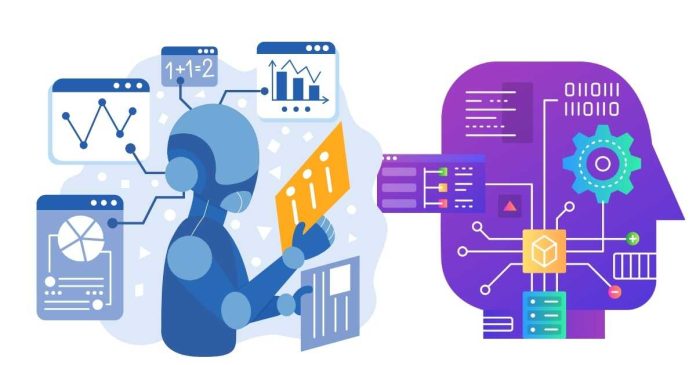Machine learning (ML) has a wide range of applications across various industries, enabling systems to learn from data and make predictions or decisions without being explicitly programmed. Some key applications of machine learning include:
1. Healthcare
- Medical Imaging: ML algorithms help in detecting and diagnosing diseases by analyzing medical images like X-rays, MRIs, and CT scans.
- Personalized Medicine: Machine learning is used to analyze patient data and predict individualized treatment plans.
- Drug Discovery: ML models assist in identifying potential drug compounds and predicting their effectiveness.
- Predictive Analytics: Machine learning is used for early diagnosis of diseases based on patient data, such as predicting heart disease or diabetes risk.
2. Finance
- Fraud Detection: ML models are used to detect fraudulent activities by analyzing transaction patterns and flagging anomalies.
- Algorithmic Trading: Machine learning algorithms analyze market trends and make high-frequency trading decisions.
- Credit Scoring: ML can help in predicting the creditworthiness of individuals or companies.
- Risk Management: Financial institutions use machine learning to assess and mitigate financial risks.
3. E-commerce & Retail
- Recommendation Systems: Machine learning powers personalized product recommendations based on user behavior, preferences, and past purchases.
- Customer Segmentation: ML helps in categorizing customers based on behavior and targeting specific marketing campaigns.
- Demand Forecasting: Predicting consumer demand for products helps in inventory management and supply chain optimization.
- Dynamic Pricing: ML algorithms can help businesses optimize pricing in real time based on various factors like demand, competitor pricing, and market conditions.
4. Natural Language Processing (NLP)
- Speech Recognition: ML models are used in voice assistants like Siri and Alexa, as well as in transcription services.
- Sentiment Analysis: Analyzing text data from social media or customer reviews to understand public sentiment towards products or brands.
- Machine Translation: Translating text from one language to another using neural networks and deep learning models.
- Chatbots: Customer service chatbots powered by machine learning can handle a wide range of user inquiries and issues.
5. Autonomous Vehicles
- Self-Driving Cars: Machine learning is essential for the development of autonomous vehicles, as it helps cars recognize objects, make decisions, and navigate environments safely.
- Traffic Prediction: ML models can predict traffic conditions and optimize routes in real time for vehicles.
6. Manufacturing
- Predictive Maintenance: Machine learning algorithms predict when machinery is likely to fail, allowing for proactive maintenance and reducing downtime.
- Quality Control: ML models help in automating quality inspection by identifying defects in products during manufacturing.
- Supply Chain Optimization: ML assists in predicting demand, optimizing inventory, and streamlining production schedules.
7. Marketing & Advertising
- Customer Behavior Prediction: Machine learning is used to predict consumer behavior, optimize marketing strategies, and improve targeting.
- Ad Targeting: ML helps in serving personalized ads based on user behavior, increasing conversion rates and ad effectiveness.
- A/B Testing: Machine learning automates A/B testing and helps marketers make data-driven decisions on campaigns.
8. Energy
- Energy Consumption Forecasting: ML helps in predicting energy demand and optimizing energy distribution.
- Smart Grids: Machine learning is used to optimize the performance and efficiency of smart grids by analyzing real-time data from power systems.
- Renewable Energy Optimization: ML models optimize the generation of renewable energy sources like wind and solar, improving efficiency.
9. Cybersecurity
- Anomaly Detection: ML algorithms help in detecting unusual patterns and potential threats, such as cyberattacks or system intrusions.
- Phishing Detection: Machine learning is used to detect phishing emails or fraudulent websites.
- Malware Detection: ML models are used to identify malicious software by analyzing code patterns.
10. Entertainment
- Content Recommendation: Platforms like Netflix and Spotify use machine learning to recommend movies, TV shows, and music based on user preferences.
- Game Development: ML is used in video games for creating intelligent non-player characters (NPCs) that adapt to player behavior.
- Content Generation: Machine learning is used for generating creative content, including music, artwork, and text.
11. Agriculture
- Crop Yield Prediction: ML models analyze weather patterns, soil conditions, and historical data to predict crop yields and optimize farming practices.
- Pest and Disease Detection: ML is used in precision agriculture to detect pest infestations or plant diseases early, reducing crop loss.
- Autonomous Tractors: Machine learning enables autonomous vehicles and machinery to perform tasks such as planting, watering, and harvesting.
12. Telecommunications
- Network Optimization: Machine learning helps optimize telecommunication networks, predicting maintenance needs, and improving service quality.
- Customer Support: ML chatbots assist in providing customer support, handling issues like billing, service inquiries, and technical problems.
- Churn Prediction: ML is used to predict which customers are likely to cancel their subscriptions and allow companies to take preventive actions.
13. Robotics
- Robot Control Systems: Machine learning is used to improve the autonomy and adaptability of robots in tasks like assembly, packing, and delivery.
- Human-Robot Interaction: ML enables robots to understand and respond to human gestures, voice commands, and other cues.
- Industrial Automation: In factories, robots powered by machine learning can perform complex tasks with precision and efficiency.
These applications showcase how machine learning is revolutionizing various industries, improving efficiency, enabling automation, and creating new opportunities.


